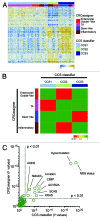Reconciliation of classification systems defining molecular subtypes of colorectal cancer: interrelationships and clinical implications
- PMID: 24406433
- PMCID: PMC3956531
- DOI: 10.4161/cc.27769
Reconciliation of classification systems defining molecular subtypes of colorectal cancer: interrelationships and clinical implications
Abstract
Recently we published two independent studies describing novel gene expression-based classifications of colorectal cancer (CRC). Notably, each study stratified CRC into a different number of subtypes: one reported 3 subtypes, whereas the second highlighted 5. Given that each ascribed clinical significance, distinctive biology, and therapeutic prognosis to the different subtypes, we sought to reconcile this apparent incongruity in subtype stratification of CRC, and to interrelate the results. To do so, we each evaluated the other's data sets and analytical methods and discovered that the subtypes and their classifiers are, in fact, clearly related to each other; indeed, the 5 subtype outcomes can be coalesced into the same three. In addition to presenting this clarification, we briefly discuss how both classification methods can be viewed within the broader literature on CRC subtypes, and potentially applied.
Keywords: CIMP; MSI; cancer subtypes; cetuximab; colorectal cancer; consensus clustering; serrated pathway; therapy resistance.
Figures



Comment on
-
A colorectal cancer classification system that associates cellular phenotype and responses to therapy.Nat Med. 2013 May;19(5):619-25. doi: 10.1038/nm.3175. Epub 2013 Apr 14. Nat Med. 2013. PMID: 23584089 Free PMC article.
-
Poor-prognosis colon cancer is defined by a molecularly distinct subtype and develops from serrated precursor lesions.Nat Med. 2013 May;19(5):614-8. doi: 10.1038/nm.3174. Epub 2013 Apr 14. Nat Med. 2013. PMID: 23584090
References
-
- De Sousa E Melo F, Wang X, Jansen M, Fessler E, Trinh A, de Rooij LP, de Jong JH, de Boer OJ, van Leersum R, Bijlsma MF, et al. Poor-prognosis colon cancer is defined by a molecularly distinct subtype and develops from serrated precursor lesions. Nat Med. 2013;19:614–8. doi: 10.1038/nm.3174. - DOI - PubMed
-
- Sadanandam A, Lyssiotis CA, Homicsko K, Collisson EA, Gibb WJ, Wullschleger S, Ostos LC, Lannon WA, Grotzinger C, Del Rio M, et al. A colorectal cancer classification system that associates cellular phenotype and responses to therapy. Nat Med. 2013;19:619–25. doi: 10.1038/nm.3175. - DOI - PMC - PubMed
-
- de Sousa E Melo F, Colak S, Buikhuisen J, Koster J, Cameron K, de Jong JH, Tuynman JB, Prasetyanti PR, Fessler E, van den Bergh SP, et al. Methylation of cancer-stem-cell-associated Wnt target genes predicts poor prognosis in colorectal cancer patients. Cell Stem Cell. 2011;9:476–85. doi: 10.1016/j.stem.2011.10.008. - DOI - PubMed
-
- Merlos-Suárez A, Barriga FM, Jung P, Iglesias M, Céspedes MV, Rossell D, Sevillano M, Hernando-Momblona X, da Silva-Diz V, Muñoz P, et al. The intestinal stem cell signature identifies colorectal cancer stem cells and predicts disease relapse. Cell Stem Cell. 2011;8:511–24. doi: 10.1016/j.stem.2011.02.020. - DOI - PubMed
Publication types
MeSH terms
LinkOut - more resources
Full Text Sources
Other Literature Sources
Medical
